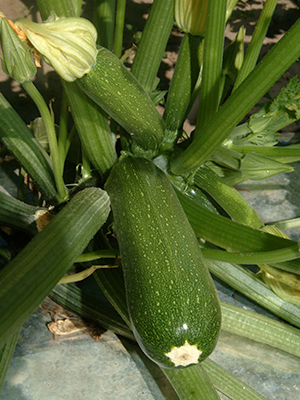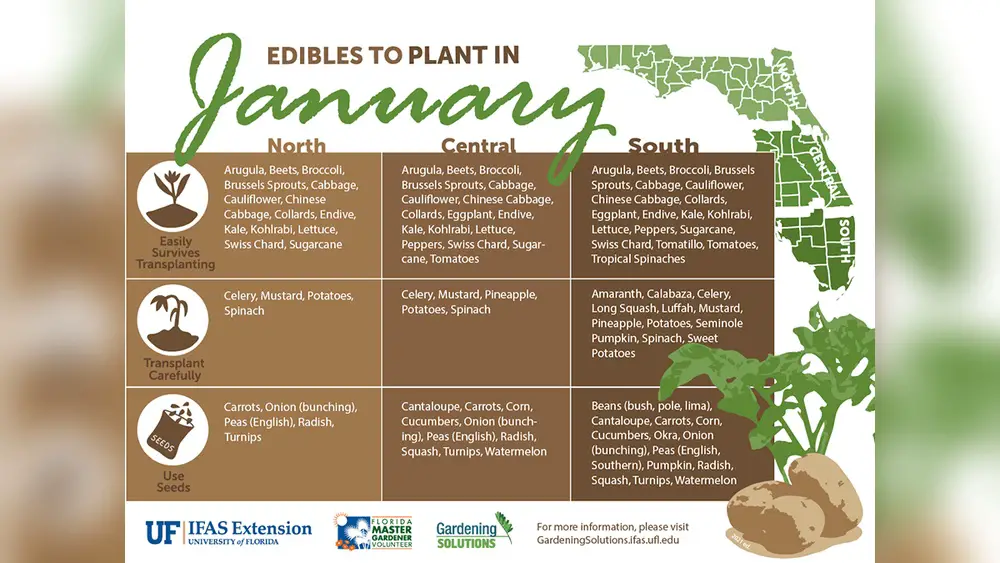If you want to grow zucchini successfully in Florida, knowing the best time to plant is key. Plant zucchini too early or too late, and you could face poor growth, fewer fruits, or pest problems.
But when exactly should you put those seeds or seedlings in the ground? Whether you live in North, Central, or South Florida, timing your planting right can make a huge difference in your harvest. You’ll discover the ideal planting windows for zucchini in Florida, plus simple tips to help your plants thrive and produce plenty of fresh, delicious squash.
Keep reading to unlock the secrets of growing zucchini the smart way and enjoy a bountiful garden all year long!
Zucchini Growing Seasons In Florida
Zucchini grows well in Florida’s warm climate. Understanding the best planting seasons helps gardeners get the most from their crops. Different parts of Florida have unique weather patterns that affect zucchini growth. Timing your planting right avoids extreme heat and pest problems. This leads to healthier plants and bigger harvests.
North Florida Planting Windows
In North Florida, plant zucchini from February to April. This period avoids late frosts and cold snaps. Another good window is August to September. These months offer cooler temperatures and less pest pressure. Avoid planting in the hottest summer months. The heat can stress young plants and reduce yield.
Central Florida Planting Windows
Central Florida gardeners can plant zucchini between February and May. This spring window ensures strong growth before summer heat arrives. A second planting window is August to September. Fall planting helps avoid intense summer sun and common pests. Late spring and summer plantings may struggle due to heat and humidity.
South Florida Planting Windows
South Florida enjoys a longer growing season. Plant zucchini from August through March. This period skips the hottest months of June and July. Cooler fall and winter months provide ideal growing conditions. Early spring planting also works well before temperatures rise. Avoid summer planting to reduce heat stress and pests.

Credit: vizcaya.org
Advantages Of Fall Planting
Planting zucchini in the fall offers many benefits for Florida gardeners. Cooler temperatures help plants grow stronger. Fall planting also leads to a longer harvest season. Choosing fall means avoiding tough summer conditions that can stress your zucchini plants.
This season suits Florida’s climate well. It gives zucchini the best chance to thrive and produce plenty of fruit. Let’s explore the main advantages of planting zucchini during fall.
Avoiding Summer Heat Stress
Florida’s summer heat can be intense and harmful to zucchini plants. High temperatures cause plants to wilt and stop producing fruit. Fall planting means zucchini grows when temperatures are cooler. This helps plants stay healthy and grow faster. Cooler weather also reduces water loss. Plants use water more efficiently in fall. This leads to better growth and bigger harvests.
Reducing Pest Pressure
Summer brings many pests that attack zucchini plants. Insects like squash bugs and cucumber beetles are more active in hot months. Planting in fall lowers the risk of pest damage. Fewer pests mean less need for pesticides. This makes fall zucchini gardening easier and safer. Healthy plants face fewer pests and produce more fruit. Pest problems drop significantly when zucchini grows in the fall.
Soil And Sunlight Requirements
Zucchini plants need the right soil and sunlight to grow strong and produce well. Choosing the best soil and providing enough sun help the plants stay healthy. These conditions affect how fast zucchini grows and how many fruits it will give. Understanding soil and sunlight needs will guide you to plant zucchini at the right time in Florida.
Ideal Soil Conditions
Zucchini grows best in soil that drains water well. Heavy, clay soils can hold too much water and harm roots. The soil should be loose and crumbly to let roots spread easily. Adding compost or aged manure improves soil quality and adds nutrients.
The soil pH should be between 6.0 and 7.5. This range helps zucchini absorb nutrients properly. Testing the soil before planting can show if it needs lime or sulfur to adjust pH. Fertile soil with good organic matter supports strong growth and large fruits.
Sunlight Needs For Best Growth
Zucchini plants need full sun to grow their best. At least 6 to 8 hours of direct sunlight each day is ideal. Sunlight helps the plant make food through photosynthesis. Without enough sun, zucchini plants grow weak and produce fewer fruits.
Plant zucchini in a spot that does not have shade from trees or buildings. Morning sun is especially helpful to dry dew and reduce disease risk. Bright sunlight also encourages flowers to bloom and attract pollinators for fruit set.

Credit: gardeningsolutions.ifas.ufl.edu
Planting Tips For Success
Planting zucchini in Florida requires some care to ensure strong growth and a good harvest. Success depends on preparing the soil well and giving plants enough space to grow. Paying attention to pollination also helps zucchini produce more fruit. These tips will guide you through important steps for planting zucchini successfully in Florida’s climate.
Enriching Soil With Compost And Manure
Zucchini plants need rich soil to grow healthy and strong. Mix plenty of compost into your garden bed before planting. Compost improves soil texture and adds nutrients.
Aged manure is another excellent choice. It provides nitrogen and other nutrients slowly, feeding plants over time. Avoid fresh manure, which can burn young roots.
Work the compost and manure into the top 6 to 8 inches of soil. This creates a fertile base for zucchini roots to spread easily and absorb nutrients well.
Proper Spacing And Pollination
Zucchini plants grow large and need space for air circulation. Plant seeds or seedlings 24 to 36 inches apart in rows that are 3 to 4 feet apart. This spacing reduces disease risk and helps plants get enough light.
Pollination is key for zucchini to produce fruit. Bees and other pollinators visit flowers to transfer pollen. Plant flowers nearby to attract pollinators to your garden.
If pollinators are scarce, hand pollinate by using a small brush to move pollen from male to female flowers. This simple step improves fruit set and yields.
Companion Plants To Avoid
Choosing the right companion plants for zucchini helps your garden grow strong. Some plants harm zucchini’s growth and health. Avoid these companions to keep your zucchini plants healthy and productive. They either steal nutrients, attract pests, or release harmful chemicals. Knowing which plants to keep away improves your garden’s success.
Potatoes And Sweet Potatoes
Potatoes and sweet potatoes compete heavily for nutrients and water. Both need rich soil to grow well. Planting them near zucchini can stunt zucchini growth. They also attract similar pests like beetles. These pests can spread quickly between the plants. Keep a good distance between zucchini and these tubers.
Other Cucurbits
Other cucurbits include pumpkins, cucumbers, and melons. These plants share the same pests and diseases as zucchini. Powdery mildew and squash bugs spread fast among cucurbits. Growing them close increases the risk of infection. It also leads to competition for space and nutrients. Avoid planting zucchini near other cucurbits.
Fennel And Its Effects
Fennel releases chemicals that stop other plants from growing well. This process is called allelopathy. Zucchini plants nearby can suffer stunted growth or poor fruit production. Fennel’s strong scent also attracts pests that harm zucchini. Keep fennel far from your zucchini bed to protect your plants.
Brassicas And Nutrient Competition
Brassicas like cabbage, broccoli, and kale use a lot of nutrients. They grow quickly and need space to spread. Planting them near zucchini can cause nutrient shortages. Zucchini may not get enough nitrogen or phosphorus. This weakens the plants and reduces yield. Avoid mixing brassicas with zucchini in the same area.
Jerusalem Artichokes And Lovage
Jerusalem artichokes grow tall and shade nearby plants. Zucchini needs full sun to thrive. Lovage releases substances that inhibit zucchini growth. Both plants can crowd zucchini and reduce airflow. Poor air circulation leads to fungal diseases. Keep these plants away to ensure zucchini stays healthy.

Credit: www.reddit.com
Common Pests And Diseases
Zucchini plants in Florida face several common pests and diseases. These can damage leaves, stems, and fruits. Knowing about these threats helps protect your garden. Early detection is key to managing problems effectively.
Florida’s warm climate encourages many pests and diseases. Some pests bore into the plant, while others suck sap or spread infections. Diseases often cause spots, wilting, or rotting. Careful monitoring and control methods keep zucchini healthy.
Squash Vine Borer
Squash vine borers are one of the most damaging pests. They lay eggs at the base of zucchini stems. Larvae tunnel inside, cutting off water and nutrients. Plants wilt and can die quickly. Use row covers and remove affected stems early.
Late Blight
Late blight is a serious fungal disease. It causes dark, water-soaked spots on leaves and fruits. The disease spreads fast in wet, humid weather. Remove infected plants immediately to stop spread. Avoid overhead watering to reduce moisture on leaves.
Aphids And Cabbage Moths
Aphids feed on plant sap and weaken zucchini plants. They also spread viruses. Cabbage moth larvae chew holes in leaves and fruits. Use insecticidal soaps or natural predators like ladybugs to control aphids. Handpick caterpillars or use Bacillus thuringiensis for cabbage moths.
Frequently Asked Questions
Can You Plant Zucchini In September?
Yes, you can plant zucchini in September in many regions. Fall planting avoids summer heat and reduces pests. Choose rich, well-draining soil and a sunny spot for best growth.
When Should You Plant Zucchini In Florida?
Plant zucchini in Florida from February to April and August to September in North and Central Florida. In South Florida, plant from August to March. Fall planting helps avoid summer heat and pests for better growth. Choose well-draining, fertile soil and a sunny location.
What Is The Secret To Growing Zucchini?
The secret to growing zucchini is planting in full sun with rich, well-draining soil. Enrich soil using compost and aged manure. Provide consistent watering and space plants properly for airflow. Pollinate flowers by hand if needed to boost fruit production.
What Should You Not Plant Next To Zucchini?
Avoid planting potatoes, sweet potatoes, cucumbers, pumpkins, melons, fennel, and brassicas next to zucchini. These plants compete for nutrients, attract similar pests, or release growth-inhibiting chemicals. Keeping zucchini separate from these reduces disease risk and promotes healthier growth.
Conclusion
Plant zucchini in Florida during cooler months for best growth. North and Central Florida gardeners should plant between February and April, or August and September. South Florida offers a longer window from August to March. Avoid the hot summer months to reduce pests and heat stress on plants.
Choose a sunny spot with rich, well-draining soil for healthy zucchini. Keep zucchini away from potatoes, sweet potatoes, and other cucurbits. Follow these simple tips to enjoy a bountiful zucchini harvest in Florida’s climate. Timing matters for happy, productive plants.

